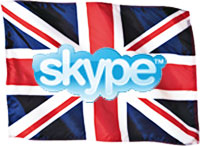 New research reveals that around two million Brits have used VoIP packages to place calls over the Internet in the last 12 months, with the figure expected to double by this time next year.
New research reveals that around two million Brits have used VoIP packages to place calls over the Internet in the last 12 months, with the figure expected to double by this time next year.
Analysts at Continental Research conducted a poll of 3,000 UK adults using VoIP and discovered that Skype was the preferred tool of choice for 48 per cent of users.
In second place was Microsoft’s MSN Messenger boasting a fifth of all calls, with Vonage and BT trailing miles behind at 6 per cent each and Wanadoo barely visible on the horizon at just two per cent.
Punters seem happy with the service, with most saying that they will increase or maintain usage over the next year, with only 1 per cent planning on using VoIP less.
 Sound quality was the most common complaint with 29 per cent citing dissatisfaction with what’s reaching their lug’oles.
Sound quality was the most common complaint with 29 per cent citing dissatisfaction with what’s reaching their lug’oles.
Mulling on the findings, James Myring, the associate director of Continental Research, told The Independent newspaper that by being early to market, Skype has enjoyed a big “first mover” advantage.
He noted that BT has huge potential to roll out VoIP to customers on a large scale, but warned that, “it will be concerned about losing market share from its fixed line business. For BT, it might be a case of compete or lose.”
 Protecting the VoIP future
Protecting the VoIP future
Elsewhere, the University of North Texas is leading a project to look at ways of protecting VoIP services from voice spam and network attacks like DoS, as well as looking into issues concerning network quality and emergency services access.
The $600,000 (£344,000) investment looks to develop a secure, geographically distributed test bed to seek out VoIP vulnerabilities before the “damage is done.”
Unveiled by the National Science Foundation, the three year security audit will also be used to sniff out potential security holes arising from running VoIP over conventional phone networks.
With VoIP being aggressively marketed, one recent study estimated that some 24 million US households will be hooked up to VoIP services by 2008.
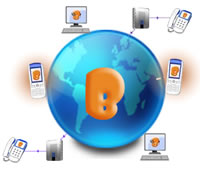 A new service, Barablu, launches today claiming to offer free voice calls and text messages between mobile phones.
A new service, Barablu, launches today claiming to offer free voice calls and text messages between mobile phones.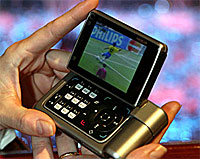 It’s as clear as the screen on your PSP that mobile phone operators aren’t very keen on ideas like this. Many commentators have claimed that the operators have gone a long way to trying to block the development and sale of WiFi-capable mobile phones – as the operators are terrified that it will erode the price of calls from ‘quite a lot’ per minute, to zero.
It’s as clear as the screen on your PSP that mobile phone operators aren’t very keen on ideas like this. Many commentators have claimed that the operators have gone a long way to trying to block the development and sale of WiFi-capable mobile phones – as the operators are terrified that it will erode the price of calls from ‘quite a lot’ per minute, to zero.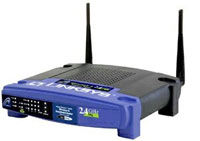 Barablu does appear to have something unique here – at least currently. The difficulty they’re going to hit is the same for anyone trying to build a community of users and provide this type of service -it’s all about the number of people you can attract on to it. If people find their friends aren’t on it, or their said friends already have a similar service – the software will get unloaded and they’ll stop using it.
Barablu does appear to have something unique here – at least currently. The difficulty they’re going to hit is the same for anyone trying to build a community of users and provide this type of service -it’s all about the number of people you can attract on to it. If people find their friends aren’t on it, or their said friends already have a similar service – the software will get unloaded and they’ll stop using it. Things are hotting up in the US VoIP market as Yahoo announces their low cost Messenger with Voice service, letting users make phone calls through the company’s instant messaging software.
Things are hotting up in the US VoIP market as Yahoo announces their low cost Messenger with Voice service, letting users make phone calls through the company’s instant messaging software. The Phone In service – which lets customers to receive calls on their computers from regular and mobile phones – is priced at $2.99 a month, or $29.90 (~£17, ~€25) a year, compared to Skype’s €30 yearly charge.
The Phone In service – which lets customers to receive calls on their computers from regular and mobile phones – is priced at $2.99 a month, or $29.90 (~£17, ~€25) a year, compared to Skype’s €30 yearly charge. Yahoo are upbeat about prospects for their new service after trials in the initial five countries proved more successful than anticipated, especially in France.
Yahoo are upbeat about prospects for their new service after trials in the initial five countries proved more successful than anticipated, especially in France. Voice over Internet Protocol (VoIP) is slowly but steadily creeping into American homes, with adoption up 20% since June 2005, and growing user satisfaction.
Voice over Internet Protocol (VoIP) is slowly but steadily creeping into American homes, with adoption up 20% since June 2005, and growing user satisfaction.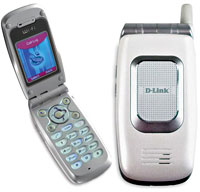 Only way is up
Only way is up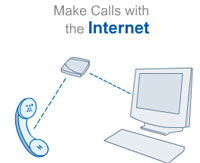 Early adopters to VoIP may recall the experience being akin to talking to a stuttering Dalek in an echo chamber, but the research revealed that 67 percent of VoIP users believe voice quality is now equal to traditional landline services, with 19 percent reckoning that internet calls sound better than those on wired phones lines.
Early adopters to VoIP may recall the experience being akin to talking to a stuttering Dalek in an echo chamber, but the research revealed that 67 percent of VoIP users believe voice quality is now equal to traditional landline services, with 19 percent reckoning that internet calls sound better than those on wired phones lines. America Online is about to come out of its corner fighting as it gets ready to slug it out with Internet heavyweights such as MySpace, Skype and Google.
America Online is about to come out of its corner fighting as it gets ready to slug it out with Internet heavyweights such as MySpace, Skype and Google. Mashing up MySpace
Mashing up MySpace Stalking Skype
Stalking Skype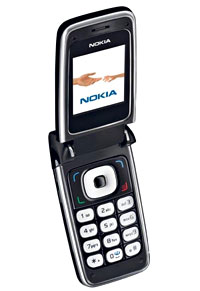 Launched at the 3GSM World Congress in Barcelona, Nokia’s new 6136 phone is being touted as the handset that brings GSM and wireless LANs together.
Launched at the 3GSM World Congress in Barcelona, Nokia’s new 6136 phone is being touted as the handset that brings GSM and wireless LANs together.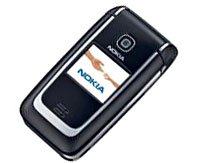 The quad-band Nokia 6136 will be able to connect to GSM networks at 850, 900, 1800, and 1900MHz (so no problems using it in the States as well as Europe) and comes with a built in 1.3 megapixel camera and FM radio.
The quad-band Nokia 6136 will be able to connect to GSM networks at 850, 900, 1800, and 1900MHz (so no problems using it in the States as well as Europe) and comes with a built in 1.3 megapixel camera and FM radio.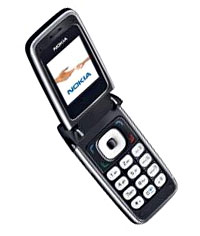 At a press conference on Monday, Jorma Ollila, Nokia’s chief executive said, “We want to help our customers complement their existing mobile services with mobile IP. UMA gives users an alternative to PC-based VoIP,”
At a press conference on Monday, Jorma Ollila, Nokia’s chief executive said, “We want to help our customers complement their existing mobile services with mobile IP. UMA gives users an alternative to PC-based VoIP,” Internet big boys Google and Skype have teamed up with two venture capital firms, Index Ventures and Sequoia Capital, to invest a mighty wedge into Fon Technology, a Spanish startup looking to build a global network of Wi-Fi hotspots.
Internet big boys Google and Skype have teamed up with two venture capital firms, Index Ventures and Sequoia Capital, to invest a mighty wedge into Fon Technology, a Spanish startup looking to build a global network of Wi-Fi hotspots. For Google and Skype, a deal with FON makes their web-based services more ubiquitously available, with developers gaining access to a new platform for creating and delivering services on a global scale.
For Google and Skype, a deal with FON makes their web-based services more ubiquitously available, with developers gaining access to a new platform for creating and delivering services on a global scale. “As we continue to grow, we will attract consumers for all three foneros categories and achieve our goal of creating a global WiFi nation. This is a great opportunity for ISP’s, bloggers, developers, early adopters, consumer electronics manufacturers and the ‘average Joe or Jane’ with a WiFi connection to make money by letting other foneros connect to the Net safely and simply,” he continued.
“As we continue to grow, we will attract consumers for all three foneros categories and achieve our goal of creating a global WiFi nation. This is a great opportunity for ISP’s, bloggers, developers, early adopters, consumer electronics manufacturers and the ‘average Joe or Jane’ with a WiFi connection to make money by letting other foneros connect to the Net safely and simply,” he continued.